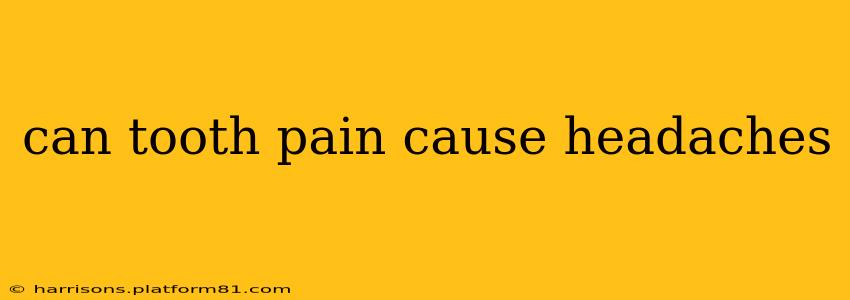Can Tooth Pain Cause Headaches? A Comprehensive Guide
Yes, tooth pain can absolutely cause headaches. The connection between toothaches and headaches is often very direct, stemming from the intricate network of nerves and blood vessels in the head and face. While not all headaches are caused by tooth problems, a significant number originate from dental issues, making it crucial to understand the relationship and how to address it.
This article will delve into the reasons why tooth pain leads to headaches, explore the types of headaches associated with dental problems, and offer guidance on seeking appropriate care.
What Causes Headaches from Tooth Pain?
The primary reason tooth pain can trigger headaches is the close proximity and interconnectedness of the trigeminal nerve. This major nerve branches throughout the face, including the teeth, jaw, and temples. When a tooth experiences inflammation, infection (such as an abscess), or significant injury, the trigeminal nerve becomes irritated. This irritation transmits pain signals to the brain, often manifesting as a headache.
The type of headache can vary depending on the severity and location of the dental problem. For instance, a throbbing pain in a specific area of the head might indicate an issue with a particular tooth, while a more generalized, intense headache could point to a more severe problem.
What Types of Headaches Are Linked to Tooth Problems?
Several types of headaches can be linked to tooth pain:
-
Tension headaches: These are the most common type and are characterized by a dull, aching pain that often affects both sides of the head. Dental issues can contribute to tension headaches by causing muscle tension in the jaw (temporomandibular joint or TMJ disorders) and surrounding areas.
-
Migraines: While not always directly caused by tooth pain, dental problems can trigger migraines in susceptible individuals. The irritation of the trigeminal nerve might act as a trigger for a migraine episode.
-
Cluster headaches: These are less common but severely painful headaches characterized by intense pain in one side of the head. While a direct link to tooth pain is less established, severe dental problems could potentially contribute to cluster headaches in certain individuals.
How Can I Tell If My Headache Is From a Toothache?
Differentiating between a headache stemming from a tooth problem and a primary headache requires careful consideration. Several factors can help determine the cause:
-
Location of pain: Is the pain concentrated around the teeth or jaw, or is it more generalized across the head? Pain localized near the teeth strongly suggests a dental origin.
-
Type of pain: Is the pain sharp, throbbing, dull, or aching? Sharp, throbbing pain associated with sensitivity to temperature or pressure often points to a dental issue.
-
Jaw pain or tightness: Jaw pain or muscle tension in the jaw is a common indicator of a dental problem causing headaches.
-
Other symptoms: Accompanying symptoms like tooth sensitivity, swelling, fever, or a bad taste in the mouth are strong indicators of a dental problem.
When Should I See a Dentist?
If you suspect your headache is related to a toothache, it's crucial to seek professional dental care. Don't delay seeking help, especially if you experience:
- Severe or persistent pain
- Swelling
- Fever
- Difficulty opening your mouth
- A noticeable abscess
Can I Treat Headaches Caused by Tooth Pain at Home?
While home remedies like over-the-counter pain relievers (like ibuprofen or acetaminophen) can temporarily alleviate the pain, they won't address the underlying dental problem. These remedies should only be used for short-term relief until you can consult a dentist. Never self-treat severe dental pain; professional assessment and treatment are essential.
What Treatments Can a Dentist Provide for Toothache-Related Headaches?
Treatment for headaches related to tooth pain depends entirely on the underlying dental cause. This can include:
- Root canal treatment: For infected tooth pulp.
- Extraction: If the tooth is severely damaged or infected.
- Filling: To repair cavities and prevent further decay.
- Crown: To protect and strengthen a weakened tooth.
- Antibiotics: To fight infection.
- Pain medication: To manage pain and inflammation.
- TMJ treatment: For jaw pain and dysfunction.
This information is for general knowledge and does not constitute medical advice. Always consult with a qualified healthcare professional for any health concerns or before making any decisions related to your health or treatment.
